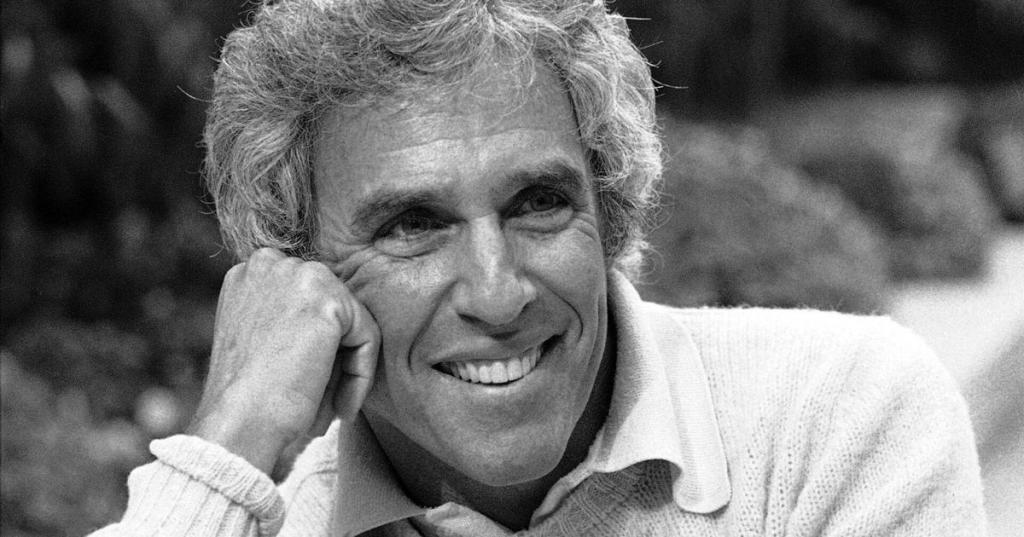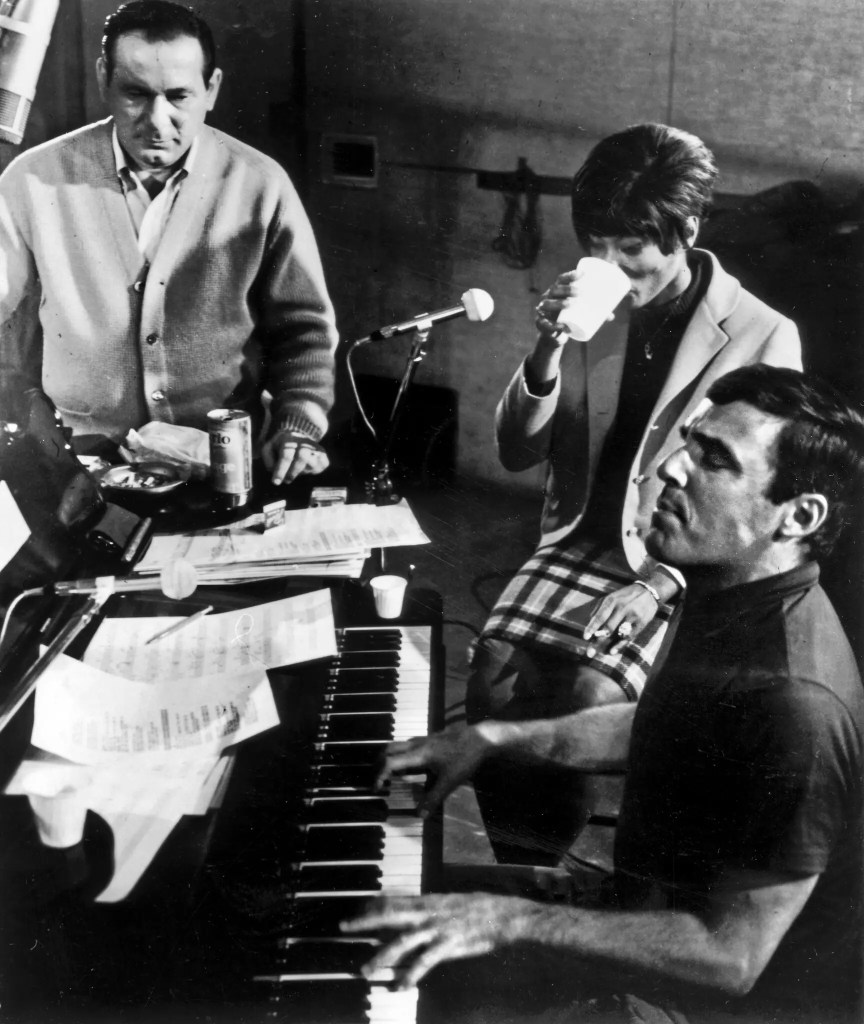Upon hearing of Burt Bacharach’s death last week at age 93, and then immersing myself in his many dozens of songs recorded by numerous artists, I was overcome by an overwhelming feeling of nostalgia.

I often get nostalgic when I look through old photo albums, watch old movies or, most notably, hear music from my childhood. Music from the 1960s, when I was between ages five and fifteen, can really trigger vivid memories and warm remembrances.
I can’t truthfully say I was an enormous fan of Bacharach and the songs he created with longtime lyrics-writing partner Hal David. They seemed pleasant enough, but they seemed decidedly unhip to me. Songs like “I’ll Never Fall in Love Again” or “Make It Easy On Yourself” may have been easy on the ears, but that’s because they were undeniably part of the “easy listening” genre my parents enjoyed. I was a Beatles devotée, and early rock and roll, and Motown, and electric blues. Bacharach’s music was pretty far removed from those musical styles.
So it was very interesting for me to discover how nostalgic I felt when I assembled the Spotify playlist you’ll find at the end of this essay. Song after song after song transported me to a simpler time when my hours were filled with riding bikes, playing catch, watching mindless TV shows or playing with HO racing cars.
Take Dionne Warwick’s treatment of “Do You Know the Way to San Jose,” a US Top Ten hit in the spring of 1968. Listening to it again this past week made me realize how deceptively simple it is when, in fact, it’s quite a sophisticated piece of pop music. Bacharach used unpredictable chord progressions, syncopated rhythm patterns and irregular phrasing, influenced by jazz harmonics, while David’s lyrics told a marvelously poignant tale of a guy who moves to L.A. to become a big singer, finds no luck and must return home to San Jose. Anyone who has ever had to give up on a dream can relate.

In the many obituaries and tributes published in the past week, the Bacharach-David song that has been referenced most often is “What the World Needs Now is Love,” made famous in 1965 by Jackie DeShannon. It starts off kind of corny but settles into a dramatic melody with moving lyrics that have stood the test of time and are just as relevant in today’s divisive world as they were nearly 60 years ago when Vietnam, civil rights and assassinations were tearing the country apart.
And then there’s “I Say a Little Prayer,” which reached the Top Ten twice in versions by Warwick in 1967 and Aretha Franklin in 1968. David said he wrote the words from the perspective of a woman at home worrying about her soldier boyfriend in Vietnam, but he wanted to keep the lyrics more general to avoid any controversy.
These songs and many other Bacharach compositions are, without a doubt, “earworms” — irresistible little tunes that, once in your head, seem to be permanently lodged there. I found myself singing/humming “There’s Always Something There to Remind Me” and “Alfie” all damn day…and I didn’t mind in the least. I marinated in them.
My research into the Bacharach-David catalog revealed a number of things I hadn’t known:
I didn’t know they wrote “Baby It’s You,” the 1962 hit by The Shirelles that was covered by The Beatles on their debut LP.
It was news to me that they wrote “One Less Bell to Answer,” the #2 hit by The 5th Dimension in 1970.
Were you aware they wrote the title song to the 1965 Woody Allen film “What’s New Pussycat?” by Tom Jones? I wasn’t.
They wrote two hits that qualify as quasi-western, both for Gene Pitney — “(The Man Who Shot) Liberty Valance” in 1962 and “24 Hours From Tulsa” in 1963.
Written by Bacharach-David and first recorded in 1963, “(They Long to Be) Close to You” became the breakthrough #1 hit that launched the careers of Karen & Richard Carpenter in 1970.
Bacharach helped co-write “Heartlight,” Neil Diamond’s last Top Ten hit, with Diamond and Carole Bayer Sager in 1982.
Between 1962 and 1970, the names of Bacharach and David appeared on the US Top 40 nearly as often as Lennon and McCartney.
Bacharach was nominated FIVE Times for the Best Song Oscar, winning twice, for “Raindrops Keep Fallin’ On My Head” from “Butch Cassidy and the Sundance Kid” and “Arthur’s Theme” from the 1981 comedy “Arthur.”

Bacharach’s music was recorded by many top artists of the era and more recent decades as well. You can hear loads of diverse covers of Bacharach songs by the likes of James Taylor, The Chambers Brothers, Patti Labelle, Naked Eyes, Tony Bennett, Idina Menzel, Christopher Cross, Cilla Black, Seal, Herb Alpert, Bobbie Gentry, Michael McDonald, Stan Getz, The White Stripes, Rod Stewart, B.J. Thomas, James Brown, Paul Carrack, Jeffrey Osborne, Diana Krall, Bobby Vinton, Greg Kihn, Stevie Wonder, Cher and Elvis Costello, among many others.
*******************
Born in 1928 in Kansas City, Bacharach grew up in Queens, where he learned cello, drums and piano at the encouragement of his mother, an amateur singer and pianist. While still a teen, Bacharach often sneaked into Manhattan jazz clubs to hear Thelonius Monk, Dizzy Gillespie and Charlie Parker, who proved influential to his later musical stylings.
While serving in the Army, he met singer Vic Damone and ended up spending three years as a pianist and conductor for him. Said Damone in 1997, “Burt was clearly bound to go out on his own. He was an exceptionally talented, classically trained pianist, with very clear ideas on the musicality of songs, how they should be played, and what they should sound like. I appreciated his musical gifts.” Bacharach later served for five years as arranger, conductor and music director for the legendary Marlene Dietrich, accompanying her on tours until he decided he wanted to concentrate on songwriting.
He met Hal David at the famous Brill Building, the Manhattan songwriting hub where teams like Carole King and Gerry Goffin churned out hits for the teenage market, but Bacharach and David wrote more sophisticated stuff in the Cole Porter vein. By the early ’60s, they had scored hits for Marty Robbins (“The Story of My Life”) and Perry Como (“Magic Moments”). In 1963, singer Jerry Butler asked Bacharach to produce the session for his song “Make It Easy On Yourself,” and with that, his career as a producer was off and running.
In his obituary in The New York Times last week, writer Stephen Holden succinctly captured Bacharach’s niche: “He was a pop composer, arranger, conductor, record producer and occasional singer whose hit songs in the 1960s distilled that decade’s mood of romantic optimism. Because of the high gloss and apolitical stance of the songs he wrote (with David) during an era of confrontation and social upheaval, they were often dismissed as little more than background music by listeners who preferred the hard edge of rock or the intimacy of the singer-songwriter genre. But in hindsight, the Bacharach-David team ranks high in the pantheon of pop songwriting.”

Bacharach seemed to be the epitome of sophisticated cool when he was paired to his vivacious second wife, actress Angie Dickinson, to whom he was married from 1965-1981. They were among Hollywood’s elite couples as both enjoyed star turns on the charts and on television.
The Bacharach-David team’s uncanny good fortune seemed to run out when they signed on to write the songs for the 1973 musical version of the classic film “Lost Horizon,” an unmitigated disaster with critics and at the box office. Bacharach let his ego get the better of him, blaming David for not supporting his attempts to wrest control from the film’s music people, effectively ending their partnership virtually overnight. He compounded his problems by reneging on a promised to produce Warwick’s next solo project, which caused estrangement between him and the most successful interpreter of his songs.
“Look, there’s no point in going over all the gory details,” Bacharach said in 1993, as he recalled the estrangement period. “It’s all behind us now. If I had to do it over again, I never, never would do it the same way.” It took more than ten years, but they ended up mending their differences in 1986 when they combined forces on the hugely popular hit “That’s What Friends Are For,” Warwick’s collaborative effort with Gladys Knight, Elton John and Stevie Wonder that reached #1 and won multiple Grammy awards.

In a 1995 interview, Bacharach offered his thoughts on his songwriting process. “I didn’t want to make the songs the same way as they’d been done, so I’d split vocals and instrumentals and try to make it interesting. For me, it’s about the peaks and valleys of where a record can take you. You can tell a story and be able to be explosive one minute, then get quiet as kind of a satisfying resolution… It may be easy on the ears, but it’s anything but easy. The precise arrangements, the on-a-dime shifts in meter, and the mouthfuls of lyrics required to service all those notes have, over the years, proven challenging to singers and musicians.”
Bacharach added, “As a songwriter, I’ve been luckier than most. Many composers sit in a room by themselves and nobody knows what they look like. People may have heard some of their songs, but they never get to see them onstage or on television. Because I’ve also been a performer, I got to make a direct connection with people, and I’ve been very grateful about that.”
In 1997, he had enough self-deprecating humor to appear as himself singing “What the World Needs Now is Love” in the hit comedy “Austin Powers: International Man of Mystery,” spoofing the ’60s James Bond cool vibe.
Rest in peace, Burt Bacharach. The world still needs “love sweet love” and will continue to sing along to your songs like the lovable, nostalgic earworms they are.
************************
It was a challenge trying to decide which versions of Burt Bacharach’s classic songs to include on this playlist. In some cases, I’ve include two or even three different renditions to show the range of styles and arrangements out there.
Even as a young rocker in 1964, I idolized Bacharach. Not all, but many of his melodic twists and turns and his unpredictable chord changes were as influential to my songwriting as The Beatles.
LikeLike
Yes, he was much more of a musical talent than many people realized. He left us quite a catalog of fine songs…
LikeLike
My wife, Suzanne, and Burt left us on the same day. Always something there to remind me..
LikeLike
So sorry about Suzanne, Scott. Your reference to Burt’s iconic song is perfect and poignant…
LikeLike
Thanks Hack, your music is appreciated now more than ever..
LikeLike
Bruce Another great musical essay – this time on Burt Bacharach. Lot’s of 60’s nostalgia to enjoy here . Check out his tune My little red book, recorded by Love. Also the 1999 collaboration album with Elvis Costello has some evocative songs.
LikeLike
Thanks, Steve. Never heard of his tune that Love recorded — I’ll check it out. The Elvis Costello collaboration is well worth hearing…
LikeLike